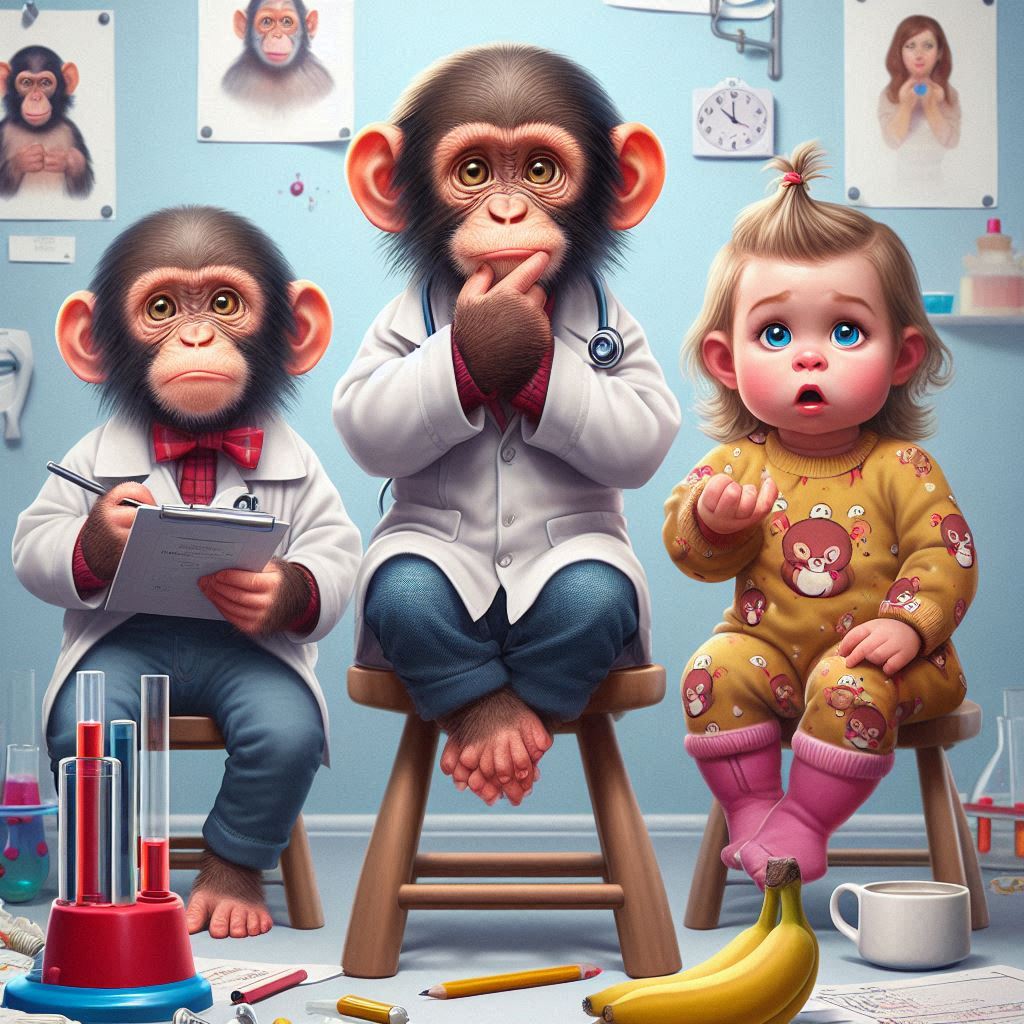
Are Monkeys Smarter Than Toddlers? – The Results of Real Scientific Tests Might Shock You!
Share
Are Monkeys Smarter Than Toddlers? – The Results of Real Scientific Tests Might Shock You!
The age-old question of intelligence in animals often leads to fascinating debates about whether monkeys are smarter than humans, or at least how they compare to us in terms of cognitive abilities. Among the most intriguing comparisons are those between monkeys and human toddlers. Both groups display remarkable intelligence, but how do they measure up when subjected to scientific tests? Let’s dive into some surprising findings from real scientific experiments and see how monkeys and toddlers stack up against one another.
Monkey Intelligence: An Overview
Monkeys, especially great apes like chimpanzees, bonobos, and orangutans, have long been recognized for their impressive cognitive abilities. These primates have large brains relative to their body size and are capable of complex behaviors such as problem-solving, social learning, and communication. Some monkey species, like capuchins, are also known for their ability to use tools—an indication of higher-level thinking.
While monkeys have not developed language or abstract reasoning on the level of humans, their intelligence is often underestimated. Monkeys can use memory, recognize themselves in mirrors, and even demonstrate emotional intelligence, understanding and responding to social cues from other members of their group.
The Toddler Mind: Early Developmental Milestones
Human toddlers, typically between the ages of 1 and 3, are rapidly developing their cognitive, emotional, and physical skills. At this stage, toddlers are learning language, understanding basic concepts like cause and effect, and forming social bonds. They may not yet possess the complex reasoning abilities of older children or adults, but they are capable of impressive feats of learning and understanding.
Cognitive milestones for toddlers include:
• Object Permanence: Understanding that objects continue to exist even when they cannot be seen.
• Theory of Mind: Recognizing that others have thoughts, feelings, and perspectives different from their own.
• Problem Solving: Figuring out how to overcome obstacles to get what they want, like using a chair to reach something on a shelf.
Scientific Tests: Comparing Monkeys and Toddlers
1. Memory and Problem Solving
In many studies, both monkeys and toddlers have been tested on their ability to remember and solve problems. One notable test is the delayed-response task, where the subject is shown a picture or object and then has to recall it after a delay.
• Monkeys: In a study involving capuchin monkeys, researchers found that monkeys could remember the position of hidden food after a brief delay, similar to how toddlers learn to remember where their toys are placed. However, while monkeys performed well on these tasks, they often showed limitations in remembering items or sequences after a longer delay.
• Toddlers: Similarly, toddlers struggle with tasks involving long-term memory but excel at recalling objects and events when the delay is short. In a study comparing the memory abilities of 2-year-old toddlers and rhesus macaques, both performed similarly when the task was simple and the delay was brief.
Surprising Result: In short-term memory tasks, toddlers and monkeys often perform similarly, but as the delay increases, monkeys tend to perform slightly better due to their more developed working memory.
2. Tool Use and Innovation
One of the key indicators of intelligence is the ability to use tools. In this respect, monkeys have a significant advantage over toddlers.
• Monkeys: Great apes like chimpanzees and orangutans are known for their advanced tool-making skills. They can fashion tools from sticks, stones, and leaves to access food, water, or even to create nests. This tool use is learned by observing others in their social groups, and some monkeys even show signs of passing down their techniques to future generations.
• Toddlers: While toddlers are very curious and enjoy experimenting with objects, they do not generally have the ability to use tools with the same level of sophistication. However, at around 18 months, toddlers begin using tools, such as using a spoon to feed themselves or a block to knock over another object. Though their tool use is rudimentary, it demonstrates early signs of creativity and problem-solving.
Surprising Result: Monkeys are far superior in their tool-making abilities, whereas toddlers are still in the early stages of developing this skill.
3. Social Learning and Imitation
Imitation and learning from others is another key component of intelligence. Both monkeys and toddlers learn by observing and copying others, but the way they do this may differ.
• Monkeys: Some species of monkeys, particularly chimpanzees, are known for their ability to learn from watching others, a process called social learning. Chimpanzees can mimic actions such as opening a box or using a tool to obtain food. They are also capable of learning by observing how a task is performed, even if it’s not immediately clear why the action is beneficial.
• Toddlers: Toddlers are exceptional imitators. Between 18 months and 2 years of age, they begin to mimic adult behavior and even show signs of over-imitation, where they copy irrelevant or unnecessary actions just because they’ve seen an adult do them. This over-imitation is thought to be a learning strategy that helps toddlers figure out complex social roles and tasks.
Surprising Result: While both monkeys and toddlers excel at social learning, toddlers tend to over-imitate, which reflects a higher level of abstract thinking about the social context, whereas monkeys are more focused on the practical aspects of the behavior.
4. Understanding of Cause and Effect
The ability to understand cause and effect is a fundamental cognitive skill. It helps individuals make predictions, solve problems, and make decisions based on their experiences.
• Monkeys: Research has shown that monkeys can understand basic cause and effect relationships, such as how pressing a button might result in food being dispensed. They can also learn tasks through trial and error, especially when there is a direct reward.
• Toddlers: Toddlers are rapidly developing their understanding of cause and effect. By the time they reach 2 or 3 years old, they can easily predict the outcomes of their actions, like pressing a button to turn on a light or stacking blocks to make a tower.
Surprising Result: While monkeys have a strong grasp of cause and effect in specific situations, toddlers demonstrate a more flexible understanding, applying cause and effect to a wider range of scenarios.
Conclusion: Who’s Smarter?
The answer to the question of whether monkeys are smarter than toddlers isn’t entirely straightforward. While monkeys excel in certain areas, such as memory, tool use, and problem-solving, toddlers outperform them in others, like social learning, abstract thinking, and the application of knowledge to new situations.
In summary:
• Monkeys are better at tasks requiring memory, tool use, and learning through social cues.
• Toddlers show stronger signs of abstract thinking, learning through imitation, and applying knowledge in new contexts.
In the end, the comparison isn’t just about intelligence in one area, but about the different kinds of intelligence. Monkeys and toddlers may be smarter than each other in some ways, but both are capable of incredible feats of learning, problem-solving, and social interaction.
CyberMutz.com (Dog-Themed Apparel & Accessories)
“CyberMutz.com – Explore a unique collection of dog-themed apparel, accessories, and gifts for pet lovers. Shop stylish, high-quality designs featuring your favorite dog breeds!”
Category Page Descriptions:
• Dog Breed T-Shirts: “Show off your love for dogs with our exclusive breed-themed T-shirts. From German Shepherds to Chihuahuas, find high-quality, comfortable tees celebrating your favorite pup!”
• Dog Breed Pet Tank Tops: “Keep your furry friend stylish and comfortable with our dog breed-themed pet tank tops. Perfect for small and large dogs, these unique designs are a must-have!”
• Funny Dog-Themed Apparel: “Love dogs and humor? Our funny dog-themed apparel blends style with witty canine-inspired designs. Shop now for T-shirts, hoodies, and more!”
• Personalized Dog Merchandise: “Customize your dog lover’s gear with our personalized pet-themed apparel and accessories. Create a one-of-a-kind look for yourself or a perfect gift for a fellow dog enthusiast!”
CyberPussyKatz.com (Cat-Themed Apparel & Accessories)
“CyberPussyKatz.com – Celebrate your love for cats with our premium collection of feline-inspired apparel and accessories. Purr-fect designs for every cat lover!”
Category Page Descriptions:
• Cat Breed T-Shirts: “Showcase your favorite feline friend with our stylish cat breed-themed T-shirts. From Maine Coons to Siamese, find the perfect tee for cat lovers!”
• Funny Cat-Themed Apparel: “Express your quirky side with our funny cat-themed T-shirts, hoodies, and more. Pawsome designs for those who love cats and humor!”
• Personalized Cat Merchandise: “Make it personal with custom cat-themed apparel and accessories. Create a unique gift or a special piece just for you!”
CyberMunkiez.com (Monkey-Themed Apparel & Accessories)
“CyberMunkiez.com – A fun collection of monkey-inspired apparel and accessories. Perfect for primate lovers who enjoy bold, playful, and unique designs!”
Category Page Descriptions:
• Monkey-Themed T-Shirts: “Go bananas over our monkey-themed T-shirts! Whether you love capuchins, chimps, or gorillas, our designs bring out your wild side.”
• Funny Primate Apparel: “Add a touch of humor to your wardrobe with our hilarious monkey and ape-inspired apparel. Great for animal lovers and jungle enthusiasts!”
• Custom Monkey Merchandise: “Make it yours! Personalize your favorite monkey designs on T-shirts, hoodies, and more for a one-of-a-kind look.”
